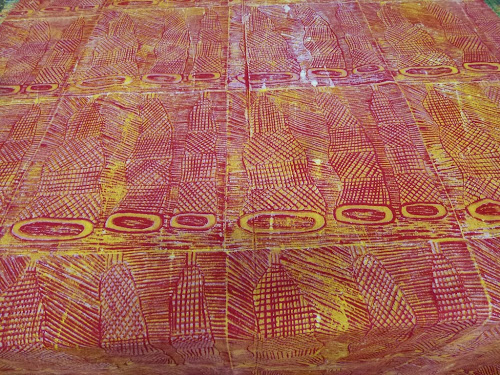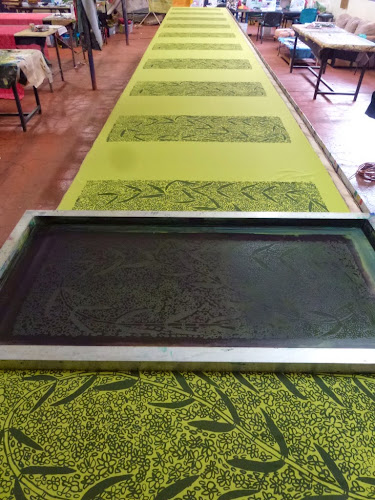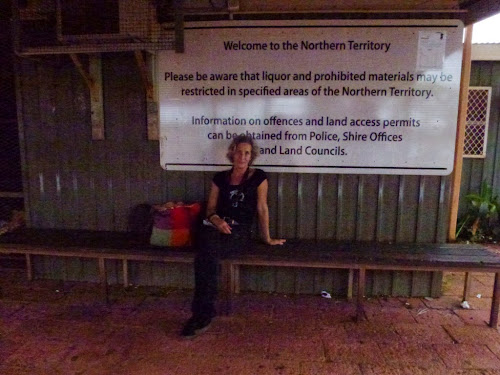Before I left I was concerned with two things. How my sensitivities would cope with my perceived notion of domestic violence, and whether, as a single woman, I could transition to life there. On those two counts, my concerns proved unjustified.
I worked as a volunteer in the Bawinanga Women’s Centre, a social enterprise providing empowerment and employment for the local indigenous women. Whilst ‘work’ as we know and understand it generally means 5 days slog to enjoy 2 days rest, the opposite seems to be true for our first nations people. Despite earning a wage for hours worked, the women often didn’t show up. Sorry business – the cultural practices and protocols surrounding death which can last up to a week, ceremony, gone fishing, gone walkabout for pandanus gathering, and other long established customs inform their day-to-day and keep cultural tradition alive and well in the community. How real!
The women are sewers, textile print-makers (lino-cuts and screenprints), artists, cleaners, op-shop attendants and much more. To hear them speak ‘language’ in the Centre I was reminded of my own ignorance. An ancient lineage it is and it made me reflect on what values and beliefs I hold dear and how often they direct my life. Notwithstanding a common indigenous view that white people are ‘tissues’ – white person arrives, white person leaves, another one takes their place – I felt their reserved welcome of me, and to make the occasional eye contact, was humbling. I was fortunate to work alongside them, teach them a few sewing techniques, and learn a whole lot more from them. Here’s some of their lovely work.
More screen-printed designs
All these designs, and hundreds more can be viewed, and bought at wwwbabbarradesigns.com.au
A parallel universe it might be, but the alternative reality was at such odds to my own that the cultural difference I experienced left me feeling emotionally drained and disturbed. As far as most of the balandas (white people) there are concerned, the Government ‘Intervention’ is a failure. Housing’s an issue, but mainly for the balandas. There’s never enough. The housing built to accommodate the indigenous people on the other hand, from the outside at least, seemed neither wanted nor needed. While I was told its frowned upon by authorities, the locals look far more comfortable sitting on the dusty red earth around the ubiquitous fire, burning day and night, in the front yard. The constant smell of smoke in town made it hard to breath. The supermarkets bulge with soft drinks, sweet biscuits, potato chips, long life milk products and 2-minute noodles. Sugar is devoured with a kind of manic obsession and the packaging dropped where it lands. ‘White man’s products! White man’s problem’! The town is one depressed looking garbage dump. The mangy, emaciated, scabby dogs in their hundreds satiate their rabid hunger by foraging through the balandas bins, knocked over by one large roaming resident pig who also feasts on dog and human faeces. "Watch that you don’t hit the dogs on the street" I’m warned, ‘Otherwise you’ll pay". Why the dogs appear to command the reverence of a holy cow I never found out. The effects of smoking and sugar consumption pose the two most serious health risks in the community, according to my friend who’s employed by the health service. About 10 percent of the school age children in town turn up to school. And why would they? They’re being asked to learn a curriculum in a language foreign to them! Once the young men are initiated at around 12, there seems no good reason for them to return to school. The school counsellor I spoke to one evening was at a complete loss to know how to engage them. ‘There’s no good male role models in town’ she lamented.
One of the most shocking of all sights I encountered though was ‘death alley’ (my description). This is a stretch of coastline some 500 metres long at the edge of town where the locals dump the clothes and personal effects of their dead. Custom suggests that the incoming tide will 5 times wash the effects clean of any undesirable spirit energy, and then, in an ideal world, it would be transferred to the tip. This doesn’t happen of course, and the result is a coastline littered with rotting and rusty rubbish, including car batteries, prams, fridges, lengths of iron, mattresses, bed-frames. etc.
I recommend the edge. It's a fascinating place, full of wonder and knowledge.
Thanks women of Maningrida.






